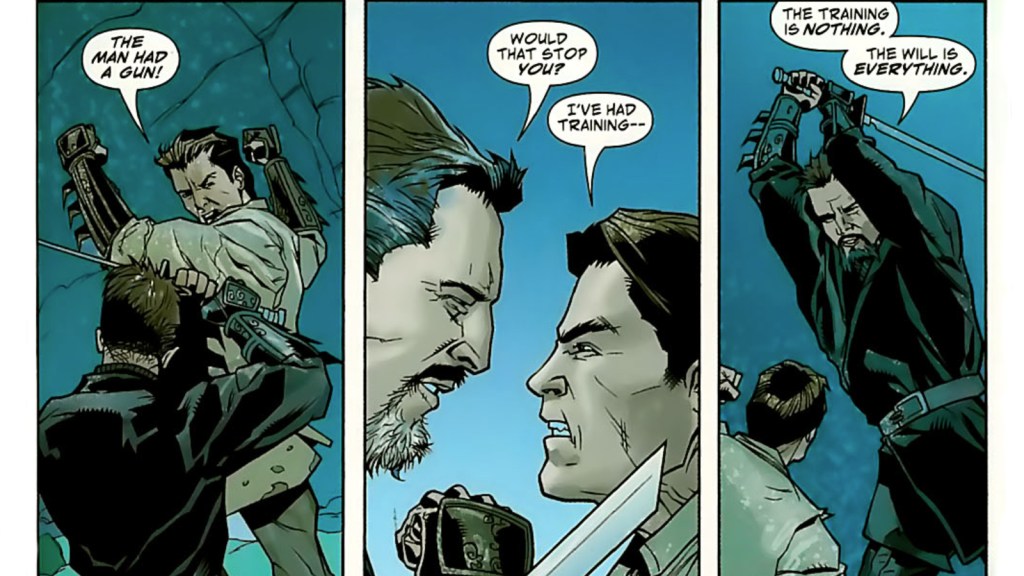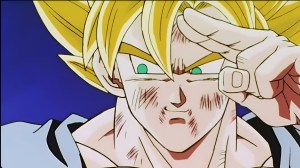It was “happy days are here again” for Batman fans in June 2005. After mixed reviews for the prior two big-budget Dark Knight films —Batman Forever and Batman & Robin —Christopher Nolan’s Batman Begins arrived. For many fans, it was exactly what film critic Roger Ebert called it at the time: “the Batman movie I’ve been waiting for.” As the title suggested, and fitting for a franchise reboot, the film retold the Caped Crusader’s origin story. It reimagined how both Bruce Wayne’s childhood fear of bats and the devastating murder of his parents shaped him into a brooding, obsessed — yet well-funded — masked vigilante. Widely cited as one of the most influential films of the 21st century, Batman Begins not only revitalized a Batman franchise that had become campy and cheesy but also helped usher in a new era of superheroes in popular culture.
Videos by ComicBook.com
For the movie’s premiere, DC Comics released the official comic book adaptation. Normally, these types of comic books serve as a means for DC to hype a film starring its characters. Indeed, the Scott Beatty and Kilian Plunkett one-shot was largely taken directly from the movie’s screenplay. However, for all the accolades, there’s one aspect of Nolan’s film where Beatty and Plunkett’s expression of Batman’s beginnings is just better.
Nolan’s Batman Begins is Great But for One Issue

While Christopher Nolan’s film retells the origin of Batman, it doesn’t strictly adhere to the original story as introduced by creators Bob Kane and Bill Finger in Detective Comics #27. As is common with film adaptations of comic books, directors are granted significant artistic license to craft a narrative that resonates with moviegoers. Perhaps to heighten dramatic tension, Nolan introduced two characters —Henri Ducard and Ra’s al Ghul— into Batman’s origin, neither of whom were part of the initial comic book story. Furthermore, in an example of the artistic freedom Nolan would later become known for, he combines Ducard and Ra’s al Ghul into a single character.
[ RELATED: After 40 Years, Batman’s Most Underrated Villain May Be One of His Best ]
The Wayne-Ducard relationship is pivotal in the film. Ducard serves as both the mentor who helps a young Bruce Wayne become the Dark Knight he was destined to be and the nemesis who haunts him forever. In the movie, the dynamic is portrayed exceptionally well by Christian Bale’s Bruce Wayne and Liam Neeson’s Ducard. However, to fully understand their relationship, fans should explore its depiction in Beatty and Plunkett’s comic book. The comic expands on Bruce’s connection with Ducard, offering the detail, depth, and emotional complexity that such a consequential bond deserves and that befits its influence in the larger storyline.
The Batman Begins Comic Adaptation Better Reflects What Bruce Wayne and Henri Ducard Meant to Each Other

Where Beatty and Plunkett’s depiction of the Wayne-Ducard relationship shines through its tighter, more focused narrative. While the relationship in the movie is dramatic, it nevertheless softens the edges with dialogue that suggests the relationship ultimately obtained a fair degree of genuine warmth, compassion, and support. Indeed, in the movie, Neeson’s Ducard/Ra’s Al Ghul says, “I believed in you… you were my greatest student… it should be you standing by my side, saving the world.“
However, perhaps stemming from a deeper understanding of Batman’s lore, particularly his interactions with both Ducard and Ra’s al Ghul, Beatty and Plunkett downplay the camaraderie between Ducard and Ra’s. Conversely, they increase the tension in their relationship by removing the brotherly dialogue and instead emphasizing, through facial cues, that when the two meet again in Gotham, there is no love lost.
Accordingly, the tone conveyed in the comic book suggests that, while the relationship did develop a fair amount of mutual respect and growth, it remained largely transactional. In other words, it never evolved to the point, despite what the movie implied, where they could have ruled over Gotham together. And that makes sense. After grasping the depth of Wayne’s pain over his parents’ deaths, could Ducard truly believe he could conceal the fact that the League of Assassins was responsible? More importantly, could Ducard realistically think he could persuade Bruce to work for him, knowing full well that he was ultimately behind their murders?
The Batman Begins Comic Shows That Batman and Ducard Were Always Headed to Conflict

In the movie, there is no dialogue between Wayne and Ducard after Wayne rescues him from the burning mountaintop temple. This leaves the impression that Wayne’s actions were driven by a bond they formed over the months they spent together. However, Beatty and Plunkett’s story demonstrates that while Wayne is grateful for the training and education he receives from Ducard, he is certainly not seeking a partner or father figure in him. It strongly suggests that Wayne simply wanted to learn everything he could before moving on — and if Ducard misread his purpose, that was purely a matter for Ducard to come to terms with.
In the comic book adaptation, Wayne makes it clear that he’s saving Ducard’s life because he’s no killer. Furthermore, when the elderly man left to take care of the injured Ducard says that he will inform him that Wayne saved his life, Bruce urges him to instead tell Ducard that he can’t stay because others “need” him. In essence, Bruce downplays any acknowledgment for rescuing Ducard, highlighting that his main concern has always been his larger duty to protect his city. Indeed, in Wayne’s view, despite the reality and lessons learned from this situation, his foremost obligation is to defend Gotham.
So, while Nolan’s Batman Begins may remain as a “superhero noir” tour de force that helped revitalize an ailing Batman franchise while setting the superhero world on fire, not all was bleak in the DC Comics Universe. Indeed, as Scott Beatty and Killian Plunkett’s comic book adaptation of Batman Begins proves — at least in terms of fleshing out one of the key relationships upon which the movie is based — nothing surpasses the comic book version.








